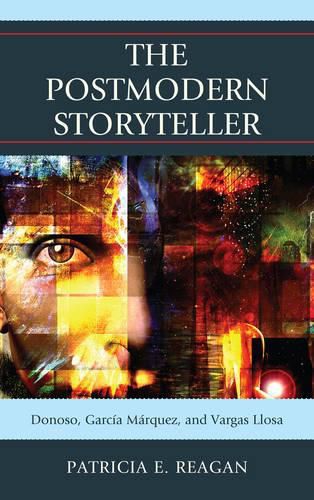Readings Newsletter
Become a Readings Member to make your shopping experience even easier.
Sign in or sign up for free!
You’re not far away from qualifying for FREE standard shipping within Australia
You’ve qualified for FREE standard shipping within Australia
The cart is loading…






The Postmodern Storyteller examines three key novels of the 1980s, including Jose Donoso’s El jardin de al lado (The Garden Next Door) (1981), Gabriel Garcia Marquez’s Cronica de una muerte anunciada (Chronicle of a Death Foretold) (1981), and Mario Vargas Llosa’s El hablador (The Storyteller) (1987). Each text has an observer narrator who is not the protagonist of the story he narrates; rather he tells the story of another individual. These storytellers can be considered postmodern not only because they reject the notion of communicating truth, but also because they require an active reader-accomplice who will formulate an individualized message for him- or herself through reading the text and observing the Other. The shift from the modern to the postmodern storyteller is necessary, because, as Walter Benjamin indicated, it has become nearly impossible to convey personal experience through a traditional first-person mode of narration in contemporary society.
As a way to preserve the importance of the author in a society in which communication is devalued, Donoso, Garcia Marquez, and Vargas Llosa, who each earned their acclaim during the Latin American literary Boom of the 1960s, reject the truth-telling function implicit in first-person narration and the testimonio genre that became popular in the 1970s. Each reactionary narrator figure investigated in The Postmodern Storyteller discards the notion of communicating truth by parodying a truth-bearing genre, which include the realist, chronicle, and ethnography genres.
As a result of the simultaneous observation of a protagonist Other, the narrator and the reader-accomplice can assuage the fragmentation of the individual in a postmodern society. As Reagan’s analysis shows, the act of reading can serve a psychotherapeutic emotional appeal for the active reader when coupled with a postmodern storyteller.
$9.00 standard shipping within Australia
FREE standard shipping within Australia for orders over $100.00
Express & International shipping calculated at checkout
The Postmodern Storyteller examines three key novels of the 1980s, including Jose Donoso’s El jardin de al lado (The Garden Next Door) (1981), Gabriel Garcia Marquez’s Cronica de una muerte anunciada (Chronicle of a Death Foretold) (1981), and Mario Vargas Llosa’s El hablador (The Storyteller) (1987). Each text has an observer narrator who is not the protagonist of the story he narrates; rather he tells the story of another individual. These storytellers can be considered postmodern not only because they reject the notion of communicating truth, but also because they require an active reader-accomplice who will formulate an individualized message for him- or herself through reading the text and observing the Other. The shift from the modern to the postmodern storyteller is necessary, because, as Walter Benjamin indicated, it has become nearly impossible to convey personal experience through a traditional first-person mode of narration in contemporary society.
As a way to preserve the importance of the author in a society in which communication is devalued, Donoso, Garcia Marquez, and Vargas Llosa, who each earned their acclaim during the Latin American literary Boom of the 1960s, reject the truth-telling function implicit in first-person narration and the testimonio genre that became popular in the 1970s. Each reactionary narrator figure investigated in The Postmodern Storyteller discards the notion of communicating truth by parodying a truth-bearing genre, which include the realist, chronicle, and ethnography genres.
As a result of the simultaneous observation of a protagonist Other, the narrator and the reader-accomplice can assuage the fragmentation of the individual in a postmodern society. As Reagan’s analysis shows, the act of reading can serve a psychotherapeutic emotional appeal for the active reader when coupled with a postmodern storyteller.